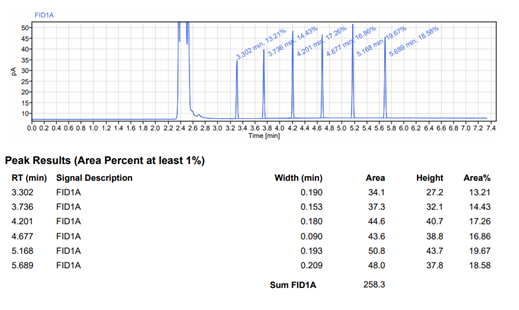Development of sustainable chemistry in undergraduate teaching laboratories
Overview

One of the traces of a calibration curve of s series of different n-alkanes which are environmental pollutants.

A reversible redox reaction
This Learning Enhancement project has been funded through SATLE (Strategic Alignment of Teaching and Learning Enhancement) with the support of the National Forum / HEA.
| PROJECT TITLE: | Development of sustainable chemistry in undergraduate teaching laboratories |
|---|---|
| PROJECT COORDINATOR: | Dr Leila Negahdar, School of Chemistry |
| COLLABORATORS: | Dr Demetra Achilleos, Dr Marcus Baumann, Prof James Sullivan, Mr Hans-Georg Eckhardt, Dr Raphaël Abolivier Students: Daniel Molloy, Freya Martin, Lee Chieng, Anastasia Tsay |
| TARGET AUDIENCE: | The primary target audience for the project includes undergraduate students enrolled in the Environmental and Sustainable Chemistry (ESC) degree program, as well as PhD students participating in the Graduate Teaching Assistant (GTA) module. Additionally, staff members involved in teaching and laboratory management have benefited from the project's focus on integrating sustainability into practices and curriculum development. |
Background
This project integrates sustainability into the School of Chemistry’s teaching, addressing gaps in the Environmental and Sustainable Chemistry (ESC) programme. By comparing similar international programmes, it identifies areas for improvement and develops new lab experiments to enhance the ESC curriculum and support accreditation.
Additionally, the project focuses on "greening" undergraduate labs by adopting sustainable practices, replacing non-eco-friendly materials, and embedding sustainability concepts into education. These efforts align with the School’s commitment to innovation and reducing its environmental impact, creating a model for sustainable education.
Goals
The project aimed to enhance sustainability in chemistry education by:
- Identifying and addressing gaps in the Environmental and Sustainable Chemistry (ESC) programme through curriculum comparison with international standards.
- Developing and implementing new laboratory experiments to strengthen the ESC curriculum and support program accreditation.
- Improving sustainability practices in undergraduate labs by reducing waste, adopting greener materials, and embedding sustainable principles into lab sessions.
The ultimate goal was to create a model for sustainable chemistry education, fostering environmentally conscious practices and improving student learning outcomes.
Approach
The project engaged students as active partners by involving them in the development and implementation of sustainable practices in the chemistry curriculum. We conducted a comparative analysis of the ESC program, identifying gaps where sustainability could be integrated. Two undergraduate interns were hired to design and implement sustainable lab experiments, providing them with hands-on experience and encouraging feedback. A research assistant worked to "green" current laboratory practices, collaborating with students to ensure the changes aligned with their learning objectives. Students were encouraged to reflect on sustainability principles through direct involvement in revising lab protocols and manuals, ensuring they took ownership of sustainable practices.
Results
Results
The project resulted in the development of five new sustainable lab experiments for the ESC programme. These experiments were integrated into the curriculum, creating a cohesive sustainability thread. Two interns assisted in the process, gaining valuable experience. Additionally, the UG lab manuals were reviewed to replace unsustainable practices with greener alternatives, such as safer solvents and reusable glassware.
Long-term, the project advanced the School’s progress towards Green Lab certification and fostered sustainable practices within the curriculum. Evidence of impact includes positive student feedback, reduced waste and energy usage, and increased awareness of sustainability.
Resources
Key resources from the project that could assist others include:
- Revised Lab Manuals: Updated manuals incorporating sustainable practices, such as greener solvents and reusable glassware.
- Sustainability Assessment Report: A detailed analysis of current lab practices, highlighting areas for improvement in sustainability.
- Green Chemistry Commitment (GCC): A framework for integrating green chemistry principles into education, which can guide other institutions.
- Research Assistant Reports: Insights on "greening" lab practices, which can inform other universities or disciplines seeking similar improvements.
- Student Feedback: Reflections from students on sustainability practices in the lab, providing valuable perspectives on engaging students in sustainability.